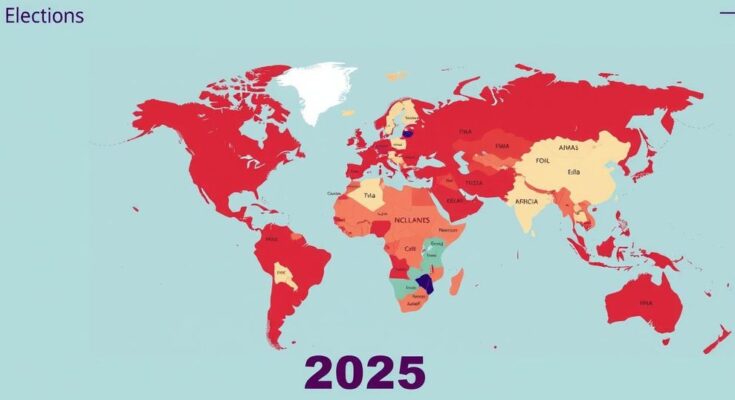Key global elections in 2025 will occur in Belarus, Germany, the Philippines, Canada, and Chile, addressing themes of inflation, populism, and instability. Belarus prepares for Lukashenko’s re-election under a non-competitive environment; Germany faces an early election due to coalition collapse; the Philippines holds midterm elections seen as a referendum on President Marcos. Canada’s Trudeau risks losing power amid criticism, while Chile seeks a new president post-Boric, facing complex political dynamics. These elections reflect significant domestic issues and broader global trends that may redefine political landscapes.
In 2025, several significant global elections will take place, notably in Belarus, Germany, the Philippines, Canada, and Chile. Each election reflects unique political dynamics and challenges, influenced by global themes such as inflation, populism, and ongoing conflicts. Belarus will witness Alexander Lukashenko’s bid for a seventh term amidst a repressive political atmosphere, with no real opposition expected. Germany’s early election arises from a coalition government collapse, highlighting internal strife and external pressures including economic stagnation and competition with China. The Philippines faces midterm elections seen as a referendum on President Ferdinand Marcos Jr., who is navigating tensions with Vice President Sara Duterte. Canada anticipates potential federal elections due to Prime Minister Justin Trudeau’s declining popularity and coalition instability. Lastly, Chile’s presidency will change hands in an election marked by a recent turbulent history and the challenge of finding a viable candidate for the ruling party.
Experts emphasize the influence of voter sentiments around economic concerns, national identity, and the struggle for power within these nations. The interplay of these factors promises to shape not only the outcome of these elections but also the political landscapes of the respective countries moving forward.
With these critical elections forthcoming, international observers will closely monitor how domestic issues and global influences converge to affect political futures in these nations, adding to the complex tapestry of global governance and democracy.
Elections serve as pivotal moments in shaping the political landscapes of nations. The upcoming elections in Belarus, Germany, the Philippines, Canada, and Chile reflect not only domestic issues but also broader global trends. In Belarus, the lack of genuine opposition underscores the authoritarian context under Lukashenko’s long-standing rule. Germany’s snap election arises from governmental disarray, revealing vulnerabilities in coalition politics amid external economic pressures. The Philippines’ elections signal the ongoing political maneuvering between the Marcos and Duterte legacies, highlighting entrenched rivalries. Canada’s potential early elections revolve around public dissatisfaction and may redefine the trajectory of Canadian policies. Chile’s election indicates the challenges of governance in a nation recovering from social unrest and attempting to establish a coherent political direction following electoral rejections of constitutional reform. The interplay of economic conditions, migration issues, and national identity will influence voter behavior and the resulting political environments, indicating a trend where elections may hinge upon public sentiments towards governance and policy effectiveness, emphasizing the interconnectedness of domestic and international political dynamics.
The elections in 2025 across Belarus, Germany, the Philippines, Canada, and Chile present crucial challenges and opportunities for each nation. The outcomes will significantly impact domestic policies, international relations, and the socio-economic climate of these countries. As voters engage in these electoral processes, the themes of populism, economic stress, and geopolitical tensions loom large, making these elections critical not only for the nations involved but also for global political stability and governance.
Original Source: www.ndtv.com




